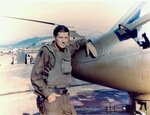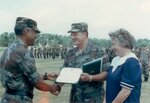



Former Fort McCoy Garrison Commander, Colonel Ray Boland, has penned a book, which covers his 30 years of service in the United States Army and National Guard. When the Bugle Calls: A Soldier’s Memoir, covers an actual period of 50 years, and the series of events that saw Boland through two tours in Vietnam, as both an aviator and combat helicopter pilot, as well as the Cold War and Desert Storm. On Tuesday, July 2nd, at 10 a.m., Boland was fittingly at the Sparta American Legion Post 100, conducting a press release for his book.
Steve Peterson, who is handling the media and publicity for Boland, stepped up to the podium and thanked the media for taking time from their busy agendas to attend the press conference. “We started out on Thursday [June 27th] with a sellout crowd down at the Wisconsin Veteran’s Museum. Then on Saturday, the book went crazy on Amazon.” Peterson is referring to Boland’s book garnering the number 1 Best Seller for its category.
From the Retired Colonel
Ray Boland walked up to the microphone and addressed the gathered press, which spanned newspaper, radio, and television outlets. He began by acknowledging that most in attendance know him from his 30-year career, which came to a close with his being the Garrison Commander at Fort McCoy. “I retired in July of [19] 91. Most people do not know that I began my service, at then, Camp McCoy, in July of 1954. I was a 16-yeard old National Guard private and would never have guessed that 37 years later, I would be back at Fort McCoy, as a regular Army, full colonel, base commander, getting ready to retire.”
Boland stated that it may seem odd that he is a first-time author at the age of 86, but he had the story in him, and it just took a while to get it all out and into print. “Twenty-five years ago, friends and family were saying, ‘Write down some of that stuff, you have got some really interesting experiences.’ And what I realized in that moment is that most veterans do not really talk about their military service.” Boland stated that the reason many stories do not get shared by veterans is that the experience is so unique that it is too hard to explain to other people unless they themselves served as well.
A Century of Sacrifice
In his book, Boland states in the introduction that the book was written to honor all the women and men who have served in the armed forces, past and present.
“It is a tribute to the United States of America for its incredible and unwavering commitment towards world freedom and peace, as today’s young people still answer the bugle call to serve their country on foreign soil. This is their story too. And yes, it needs to be shared.”
A moving line, shortly after this, is “Yes, I encourage veterans to tell their stories. Without these efforts, generations of important experiences will perish, and mounds of reflection and understanding will be lost.”
Boland spoke to this energy at the press release. “I like to talk about America being involved in a century of sacrifice,” Boland expressed to the press. “For the cause of freedom and peace, throughout the world. Our men and women have travelled to every corner of the earth. I think their legacy is unmatched, in all of history.”
The Chronology
Boland’s first chapter takes us smack dab into the center of his childhood. Ray was born in the Southwest side of Chicago, near 51st Street and Damen Avenue, in Chicago, Illinois. He speaks of the impact of WW II, ration cards, and how families were glued to their radios, as information rolled in from overseas. He also spoke of a tiny stretch of 20 blocks that encompassed his life, and how everything he liked was only 5 cents, like ice cream, Pepsi, and baseball cards. Boland paints the scene with his words quite vividly.
Next, Boland spoke on his career. “My own experience of thirty years covers a lot of ground,” he said. Boland was called up from the National Guard, in 1961, when the Cold War began. “The Berlin Wall went up, and I would see it come down, in 1989, right before I retired.”
Boland went on to relay to the press that he had served two tours in Germany during the Cold War, in combat-ready units. “I can assure you that those years, in those units, it was intense. It was a hardball environment, where we were always on alert.” During those time frames, Boland said that they had to be ready to go within 2 hours, at every moment. He then stated, “It was gratifying to see that time period come to an end.”
Boland also served two tours of duty in Vietnam. “My first tour was in 1966 and the second time was in 1970. I have a chapter dedicated to each of those individual tours in the book, and they were vastly different.”
On his first tour, Ray informed the press that he had flown airplanes, resupplying remote special forces camps. On his second tour, in 1970, Boland commanded a Cobra attack helicopter unit, in the 101st Division. Boland said, “In fact, the Cobra [helicopter] that sits out here in the parking lot [American Legion Post 100] is exactly like the ones I flew in Vietnam.”
Boland then went on to state that he started rising both in rank and areas of responsibility. “A couple of years before I came back to Fort McCoy, I was at the Army headquarters, in Atlanta. I was responsible for the planning team that worked on the removal of Noriega [Manuel Antonio] from Panama. That was one of the more interesting experiences I was involved with, in my entire 30 years. It was a very difficult operation. We had a lot of non-combatants embedded in the Panama area, so removing Noriega, while minimizing danger to our dependents and other civilians, was challenging … but it worked; we got it done”
Coming Back to Fort McCoy
Boland informed the press that it was his choice to come back to Fort McCoy. “It felt great to be back home,” Boland started out. “While I thought it was going to be a 2-year period of transition, to get ready for civilian life, Desert Shield and Desert Storm began, unexpectedly, in August of 1990.”
Boland went onto to explain that Fort McCoy had gone into a 24/7 situation. “We had 10,000 soldiers that came to us [Fort McCoy], from as far as the Dakotas, to the state of Ohio. We had to get them ready and deploy them, mostly to Saudi Arabia.”
Boland compared the press conference to that timeframe, when he would spend many hours with the press. “It was a very scary time. There were a lot of uncertainties and unknowns, such as chemical warfare from Saddam Hussein.”
Boland went on to inform the press that he spoke with great confidence about what people could expect from the war. “I knew that the Iraqi Army was no match for us. We went through them rather easily, and we did not suffer many casualties.”
It has been an adventure
Boland iterated that it was a pleasure to sit down and reflect upon the 50 years of time he has written about, beginning with Chicago, when Pearl Harbor was bombed, and then moving to Friendship, Wisconsin, at 17-years old.
“Readers are telling me that they are connecting with the message I created in this book and that is very motivating to me.”
From the Editor
Having written three books and published two of them, I felt quite at home at Ray’s press release. Having been a Marine endeared me to his message as well. Before I left the American Legion Parking lot, I ordered the hardcover version of When the Bugle Calls: A Soldier’s Memoir, by Raymond G. Boland. I read through the introduction and the first chapter, and I am already hooked. Such detail on his childhood in Chicago took me right there. Ray speaks highly of his parents, from his hard-working father – Ray Sr., to his tough mother, Ann, both who helped him tremendously along his youthful journey.
Ray pulled me in quick, as I am sure will happen to anyone who picks up a copy for themselves. He is kind in his words, and even with my tired mind from writing articles and editing other pieces, I have found it quite captivating already. Congratulations go out to Ray Boland and his wife, Donna, for bringing this wonderful creation to fruition.
Comments
No comments on this item Please log in to comment by clicking here